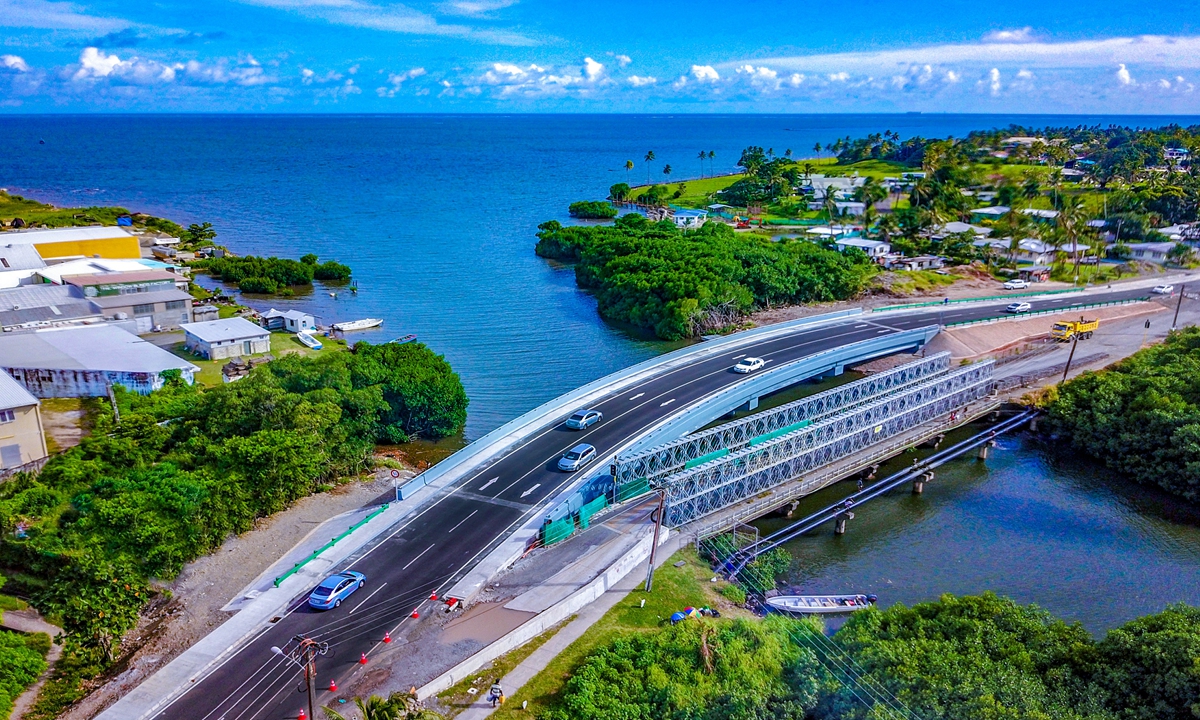
A bridge built by China Railway 14th Bureau Group Co in Fiji. Photo: Courtesy of the 14th Bureau of China Railway Construction Co
In recent weeks, several Pacific Island Countries (PICs) have strongly reaffirmed their commitment to the one-China principle through various diplomatic engagements and public declarations.
From Saturday to Tuesday, Fiji’s largest newspaper, the Fiji Sun, published a series of special editions to introduce and reaffirm the one-China principle. These included an article by Chinese Ambassador to Fiji Zhou Jian, titled “One China is Undeniable Truth,” emphasizing that the one-China principle is the foundation for healthy and stable China-Fiji relations.
The special edition also included commentaries from the Chinese media, highlighting that the island of Taiwan has always been an inseparable part of China, and reaffirming the international consensus established by United Nations General Assembly Resolution 2758.
On Tuesday, the Chinese Embassy in Papua New Guinea (PNG) noted that mainstream PNG media reports have also published special sections on the one-China principle. Chinese Ambassador to PNG Zeng Fanhua contributed an article titled “Strengthen Foundation of One-China Principle, Create Brighter Future for China-PNG Relations Together.”
The sections also featured statements from PNG Foreign Ministry Secretary Elias Wohengu and other figures reaffirming their support for the one-China principle. Wohengu stated that PNG firmly adheres to the one-China policy, recognizing the People’s Republic of China (PRC) as the sole legal government representing all of China and opposing “Taiwan independence,” according to the embassy.
On the same day that Taiwan’s regional leader delivered a speech on Monday, the Republic of Nauru issued a statement reiterating its adherence to the one-China principle.
“The resumption of diplomatic relations between the Republic of Nauru and the People’s Republic of China asserts the one-China principle and reunification of China. Nauru reiterates its firm support and adherence to the one-China principle, recognizing that there is but one China in the world, with the government of the PRC as the sole government representing the whole of China,” read the statement.
On Saturday, Chinese Ambassador to the Solomon Islands Cai Weiming met with recently elected Malaita Province Premier Elijah Asilaua, congratulating him on his victory and expressing China’s willingness to deepen cooperation with Malaita based on the one-China principle. Asilaua thanked China for its contributions to Malaita and the Solomon Islands’ economic and social development, reaffirming Malaita’s support for the central government’s one-China policy and the intention to enhance cooperation in infrastructure and agriculture, according to the embassy.
Newly elected Prime Minister of the Solomon Islands Jeremiah Manele noted in a recent interview with the Chinese media that the decision to establish diplomatic relations with China in September 2019 is considered the most significant choice made by the country since gaining independence over 45 years ago. Manele also reaffirmed the country’s commitment to the one-China principle, according to CGTN.
On Saturday, the Chinese Embassy in Tonga published an article titled “United Nations General Assembly Resolution 2758 Brooks No Challenge and Misinterpretation.”
“For quite some time, the separatist forces of China’s Taiwan region and certain major countries have been deliberately distorting and challenging the one-China principle and United Nations General Assembly Resolution 2758, trumpeting the notion that Taiwan’s status is undetermined, and advocating support for Taiwan’s participation in the United Nations conferences and activities,” the article said.
These moves attempt to invent a whole set of false narratives to mislead international public opinion and trample on international law and basic norms governing international relations. “In view of this, it is more than necessary to comprehensively and systematically explain the origin and facts of Resolution 2758 to our Tongan friends, so as to set the record straight,” the article added.
On May 15, after the opening ceremony of Vanuatu’s mid-year parliamentary session, governmental leaders and officials accepted an invitation from Chinese Ambassador Li Minggang to visit the embassy.
Ambassador Li expressed appreciation for Vanuatu’s consistent adherence to the one-China principle since establishing diplomatic relations, and its support for China’s efforts toward peaceful reunification. “Currently, cross-Straits relations are complicated, with tensions in the Taiwan Straits rooted in the separatist agenda of Taiwan’s Democratic Progressive Party authorities and external interference. Let us remain vigilant and committed to peace in the Taiwan Straits,” Li said.
Seoule Simeon, speaker of the Vanuatu parliament, urged all members of parliament to remember the reality that there is only one China in the world, Taiwan is an inseparable part of China, and the government of the PRC is the only legal government representing the whole of China.
Prime Minister Charlot Salwai called on government ministers to maintain unity in adhering to the one-China principle and advancing the comprehensive strategic partnership between Vanuatu and China, according to the embassy’s report on WeChat.
